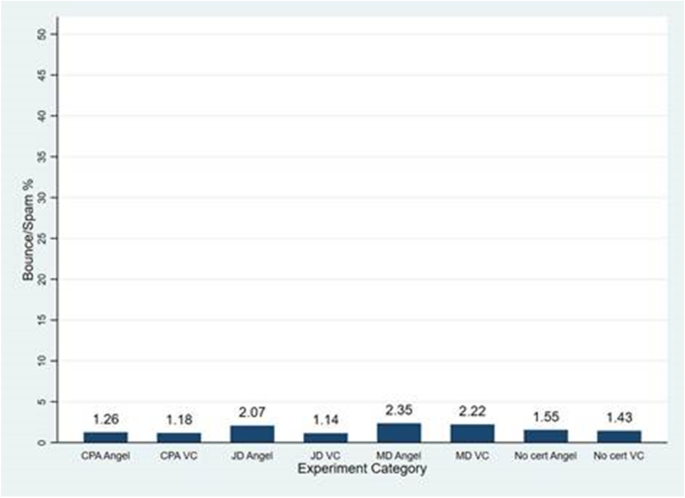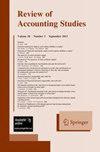Startups’ demand for accounting expertise: evidence from a randomized field experiment
IF 5.8
3区 管理学
Q1 BUSINESS, FINANCE
引用次数: 0
Abstract
Abstract We conduct a randomized field experiment (RFE) to assess whether startup firms perceive accounting expertise as an important investor credential. We send 13,358 unsolicited and unique emails to active startup firms across the US, showing an interest in them with a proposition to meet a bogus investor. The experiment has high response rates, with 4,535 (33.94%) opened emails and 828 (6.19%) website visits, reflecting investors’ proliferating practice of outbound origination to contact new startups. Our RFE compares startup reactions to fictitious investors with certified public accountant (CPA) designations versus two control groups: investors without credentials and those with other professional licenses. Startup firms are 48% likelier to read unsolicited emails from CPA-bearing investors and 47% likelier to visit their websites, relative to investors with a medical license. We document an analogous preference for CPA-bearing investors even when we separately analyze startups in medical-related industries. This gap persists when investors pose as angels, venture capitalists (VCs), or without professional licenses. The relatively low percentage (2.5%) of email bounces and spam reports makes it unlikely that spam algorithms drive the findings. Further tests reveal that the response rates differ by firm age, which is inconsistent with spam filter explanations but congruent with startup firms’ demand for accounting expertise. Finally, we undertake a follow-up experiment with 3,443 new startups to distinguish between accounting and general business expertise using a master’s in business administration (MBA). Startups are 13.8% likelier to read emails from a CPA-bearing investor than from an MBA-credentialed investor and 22.6% more likely to visit the CPA-bearing investor’s website.

创业公司对会计专业知识的需求:来自随机现场实验的证据
摘要本文采用随机现场实验(RFE)来评估创业公司是否将会计专业知识视为重要的投资者凭证。我们主动向美国各地活跃的初创公司发送了13358封独特的电子邮件,表示对它们感兴趣,并提议与虚假投资者会面。该实验的回复率很高,有4535封(33.94%)邮件被打开,828封(6.19%)网站被访问,这反映了投资者越来越多地通过对外发起来联系新创业公司。我们的RFE比较了创业公司对具有注册会计师(CPA)资格的虚构投资者的反应,以及两个控制组:没有资格证书的投资者和拥有其他专业执照的投资者。与持有医疗执照的投资者相比,初创公司阅读持有注册会计师的投资者发来的不请自来的电子邮件的可能性要高48%,访问其网站的可能性要高47%。即使在我们单独分析医疗相关行业的初创公司时,我们也记录了对持有注册会计师的投资者的类似偏好。当投资者以天使、风险资本家(vc)或没有专业执照的身份出现时,这种差距依然存在。相对较低的百分比(2.5%)的电子邮件反弹和垃圾邮件报告使得垃圾邮件算法不太可能推动调查结果。进一步的测试表明,回复率因公司年龄而异,这与垃圾邮件过滤器的解释不一致,但与初创公司对会计专业知识的需求一致。最后,我们对3,443家新创业公司进行了后续实验,以区分使用工商管理硕士(MBA)的会计和一般商业专业知识。创业公司阅读持有注册会计师证书的投资者发来的电子邮件的可能性比阅读持有mba证书的投资者发来的电子邮件的可能性高13.8%,访问持有注册会计师证书的投资者网站的可能性高22.6%。
本文章由计算机程序翻译,如有差异,请以英文原文为准。
求助全文
约1分钟内获得全文
求助全文
来源期刊

Review of Accounting Studies
BUSINESS, FINANCE-
CiteScore
7.90
自引率
7.10%
发文量
82
期刊介绍:
Review of Accounting Studies provides an outlet for significant academic research in accounting including theoretical, empirical, and experimental work. The journal is committed to the principle that distinctive scholarship is rigorous. While the editors encourage all forms of research, it must contribute to the discipline of accounting. The Review of Accounting Studies is committed to prompt turnaround on the manuscripts it receives. For the majority of manuscripts the journal will make an accept-reject decision on the first round. Authors will be provided the opportunity to revise accepted manuscripts in response to reviewer and editor comments; however, discretion over such manuscripts resides principally with the authors. An editorial revise and resubmit decision is reserved for new submissions which are not acceptable in their current version, but for which the editor sees a clear path of changes which would make the manuscript publishable. Officially cited as: Rev Account Stud
 求助内容:
求助内容: 应助结果提醒方式:
应助结果提醒方式:


